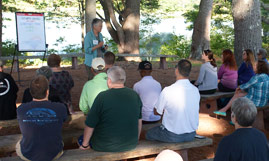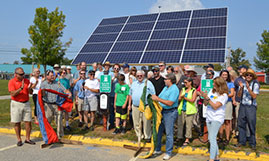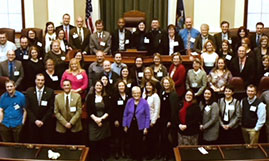FOR/Maine and Maine Development Foundation Announce Grants Totaling More Than $1-million for Mill Site Redevelopment in Five Maine Communities
AUGUSTA, ME – June 17, 2020 – The FOR/Maine (Forest Opportunity Roadmap) coalition – a broad coalition working to diversify the state’s wood products businesses, attract capital investments, and develop greater economic prosperity for rural communities – and Maine Development Foundation (MDF) are pleased to announce grants totaling more than $1-million to five Maine communities impacted by recent mill closures.
The funds will be used for redevelopment projects deemed catalytic for the next generation of forest economy products, especially during this critical transition in global markets. The grants are primarily funded by the Northern Border Regional Commission and the Maine Rural Development Authority. They will be administered by Maine Development Foundation, which staffs the FOR/Maine coalition and is a key partner in the coalition’s work.
“This is an extremely positive step forward both to provide critical funding to these communities, but also because this funding was developed by a coordinated and concerted effort that focused on regional needs rather than just one group or community,” says Charlie Spies, CEO, CEI Capital and FOR/Maine Communities Subcommittee Chair. “The need was apparent as one mill after another shut down over the last decade, leaving these century-old, forest-based economies anchorless. The recent appearance of the COVID-19 pandemic only exacerbates the need. It is a model for future work that can be replicated to continue transitioning these economies to make them more diverse and sustainable.”
The five awardees prevailed through a process aimed at identifying new opportunities that will have a fundamental impact on economic revitalization and the next generation of forest products:
- Ashland – $150,000 to develop a new Structural Round Timber market on the east coast based in Ashland.
- East Millinocket – $210,000 to stabilize the former Great Northern Paper mill campus, including the repair of several structures to make them available for long-term lease for forest-products businesses.
- Lincoln – $185,000 to redevelop the Lincoln Paper & Tissue mill site through feasibility assessment and planning related to building rehabilitation, upgrading essential infrastructure, and restoring waste water treatment.
- Madison – $400,000 to redevelop the Madison mill site through demolition of the special chemicals building and boiler house for a new use of the site by GO Labs for the production of wood fiber-based insulation products.
- Millinocket – $216,090 for energizing the substation on the brownfield portion of the Great Northern Paper site, where potential tenants are ready to locate contingent on the upgrades.
“These funds will provide a significant boost to the efforts underway to revitalize the industrial site formerly owned by Madison Paper Industries,” explained Tim Curtis, Town Manager of Madison. “Madison is fortunate to be in a partnership with GO Lab, an up-and-coming timber products manufacturer and new owner of the site. Thank you for your contribution to make Madison an even better place to live and work. We are deeply grateful for the tireless efforts of MDF to assist municipalities hit hardest by the closure of paper mills over the past several years. MDF’s collaboration with the Northern Border Regional Commission and the Maine Rural Development Authority has resulted in direct funding to help former mill towns rebuild”
The awards are part of the Increasing Prosperity for Maine’s Forest Economy Communities subgrant program, which is funded by the Northern Border Regional Commission (NBRC), Maine Rural Development Authority (MRDA), and with additional matching funds from the U.S. Economic Development Administration, the Maine Department of Economic and Community Development, and FOR/Maine.
“We are excited to play a role in funding this group of projects, and to see these funds go to support innovative efforts to diversify Maine’s forest economy communities,” says NBRC Executive Director Rich Grogan. “It is also crucial that these investments support new forest economy products, furthering this industry’s rich tradition in Maine, and across the NBRC region.”
Maine Department of Economic and Community Development, with the leadership of Commissioner Heather Johnson, provided crucial matching support to this federal-state partnership. The members of Maine’s congressional delegation have also been instrumental in advocating for the increased, targeted funding for the regional Forest Economy program at NBRC, as well as for the federal funding support to establish FOR/Maine in 2016 and begin implementing its recommended strategies.
“The forest products industry has been a critical economic contributor to rural Maine communities for generations, and with the right investments, it can continue to play a vital role in our state for years to come,” said Senators Susan Collins, Angus King, and Congressman Jared Golden. “The work of the industry-led FOR/ME initiative has helped position this sector for continued success, and these grants for Ashland, Millinocket, East Millinocket, Lincoln, and Madison will build on its progress. Investments in these communities will bolster the development of new sustainable forest products, help support good quality jobs in each region, and take important steps toward our shared goal of revitalizing Maine’s forest economy.”
For more information and to set up interviews contact Adam Burk, Program Director, Maine Development Foundation aburk@mdf.org.







